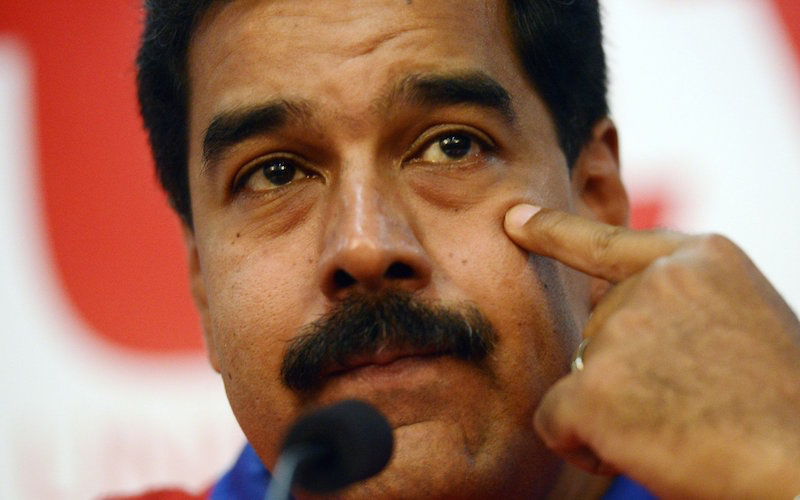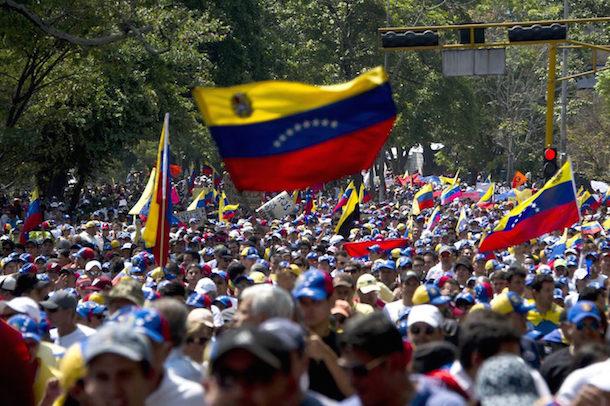
Venezuela in Crisis
Venezuela is moribund due to ineptitude and hubris. Its downfall is not difficult to comprehend nor unexpected. Tying the financing of unsustainable welfare programs wholly to volatile oil markets made Venezuela’s well-being dependent upon the continued rise in global oil prices. When oil prices plummeted, so did Venezuela’s very being. The authoritarian country should be a lesson to others in Latin and South America that have followed a similar path.
Venezuela has reached its endgame. Food and medicine shortages are commonplace. The bolivar remains in a tailspin, inflation is skyrocketing and a debt default is expected by year’s end. Human rights abuses continue to plague the country and street violence has made Caracas more deadly than Baghdad. Coupled with mounting fears stemming from the Zika virus’ spread and a crippled healthcare system, the state’s promises will remain unfulfilled; the Bolivarian revolution’s impending demise will only further exacerbate regional problems.
Petro-Socialism’s Slow Collapse
Venezuela’s government continues to rely heavily upon the institutionalized rhetoric of ‘blame the West’ for all the country’s problems, which affords them the opportunity to shirk responsibility for their own failures. Has the West meddled in Venezuela’s domestic affairs for decades? Of course it has and to suggest otherwise would be disingenuous.
However, the Chavez and Maduro administrations have had the last 16 years to avert the current crises the nation faces and there is virtually nothing at play in Venezuela that is the fault of any foreign intervention. Creating a top-heavy government on the whims of an irrational energy market was doomed to fail from the beginning, and the decision to do just that lies wholly on the gravestone of Chavez.
It is a well-known risk that countries cannot base long-term, social-development policies on world commodity markets, and the terms that explain situations such as the one Venezuela finds itself – ‘Dutch Disease’ or ‘Resource Curse’ – are decades old.
When crude oil prices skyrocketed, Venezuela ought to have reformed its national initiatives to develop new opportunities for economic diversification, in order to reduce its oil dependency and buffer potential future price shocks. Rather, they doubled-down on resource-based greed and now the government is facing the consequences of its own short-sightedness.
Cracks in the façade of Venezuela’s economy became apparent when crude oil’s price collapsed in 2007/2008. New domestic policies to bolster manufacturing and agricultural development should have been implemented, particularly for a country where more than 90% of its exports are based upon oil. Yet, the Chavez and Maduro governments decided to reinforce the status quo system that was predicated on crude prices remaining high.
Covering Up Economic Incompetence
It was January 2016 when President Maduro released Venezuela’s economic data, the first time such information was released since the end of 2014. Venezuela’s government knew it was in financial crisis and did very little to abet the impending economic implosion. What Venezuela’s government attempted to hide is the fact that its economy shrank for seven consecutive quarters, that its inflation skyrocketed 141% in 2015, and that its complicated, three-tiered currency exchange program has been a bane to the bolivar’s valuation.
The Maduro administration’s internal reports only confirmed what the world had been saying for months – Venezuela is unstable and its collapse is inevitable. The country is broke and is expected to default on its debts by the end of 2016. There is a reason why Venezuela hid its internal economic assessments from the world – the country has been in an unstoppable, downward economic spiral for years.
For decades, it has been common practice for cash-strapped countries to turn to the IMF or World Bank when they are struggling to remain solvent; however, the region has been damaged more than it has benefited from both of these financial institutions. It is due to this that Venezuela turned toward Beijing for its economic survival.
It was soon after Venezuela began hiding its economic reports that President Maduro flew to China to beg for emergency loans to stabilize the country, only to find that Beijing is no longer interested in lending money to countries with little to offer in return. Rather than supplying the requested emergency loans, China merely restructured its long-term investments with Venezuela. As its own economy slows, China is growing increasingly wary to lend financial support to nations with crumbling economies, no matter how much countries like Venezuela tend to toe the Communist Party line.
Venezuela’s economic freefall reflecting its domestic policies’ inefficiencies, and its inability to curry economic support from its international sympathizers has forced the Maduro government to fall back into a familiar tone: blame everyone but Venezuela for its own failures.
Ignorance is Bliss
Hugo Chavez and Nicholas Maduro have relied heavily on foreign-intervention conspiracy theories to galvanized support from party loyalists and nationalists. Creating the perception that Venezuela is continually under siege from foreign agents affords the leadership the opportunity to shirk responsibility for its own failed policies. Unfortunately, given past Western meddling in the continent these wild accusations carry a modicum of merit for many current regime supporters.

In as recently as 2014, the Venezuelan government publicized its success in breaking up a, supposed, military coup, which led President Maduro to proclaim that “there’s a world campaign against Venezuela” that has been trying to meddle in the nation’s domestic affairs. Such accusations have become standard practice throughout the region, particularly when governments feel domestic support is waning. The rhetoric resonates deeply and has been utilized to undermine popular protests and reform efforts that are seen to usurp government power.
Street protests are a common occurrence throughout Venezuela and they have continually been deemed illegitimate uprisings influenced by foreign operatives, as a means to undermine the government’s or the Venezuelan people’s will. Fabricating a narrative that foreign influence is weakening domestic initiatives dismisses the people’s legitimate grievances regarding insecurity, blackouts, food and medicine shortages, and inflation. There are no foreign conspiracies, only domestic incompetence. Hiding its own economic data from international scrutiny illustrates that the Maduro regime is completely aware of its own failings, even as it continues to blame the West for its shortcomings.
It was not long after China’s snub relating to loaning Venezuela emergency funds that the Maduro government expressed his interest in not only re-opening a dialogue with the United States, but also exchanging ambassadors. Venezuela’s government is well aware that it can garner domestic support with blame-the-West rhetoric, while, simultaneously, working behind the scenes to establish better relations with the international community.
With China turning a deaf ear to Venezuela’s concerns and the United States’ reaffirming a standing executive order calling Venezuela “an unusual and extraordinary threat to the national security and foreign policy of the United States,” and by extension the international community, Venezuela has spent months restructuring its power in a last-ditch effort to avert complete collapse.
A Civil-Military Union
Economically crippled and President Maduro’s speeches falling flat on a weary population, Venezuela’s government faced a rising opposition in the National Assembly at the end of 2015. The end was nearing and Maduro could feel his power slowly slipping away.
He threatened the Venezuelan people that if his party were to lose the National Assembly election that he planned to “govern with the people in a civil-military union” and that if he were to lose the National Assembly that “there will be a massacre.” Compelling a population to remain docile and complacent by threatening them with state violence shows that Maduro’s adamant rhetoric painting Venezuela as a democracy is nothing more than a sham.
Ensuring state violence is a viable option as Venezuela has spent months positioning military leaders in prominent roles throughout the nation’s institutions. In doing so, the power of the military in Venezuela’s day-to-day affairs has increased tremendously, as former military officials govern almost half of the country’s 23 states while senior officers oversee many key posts in defense, food, electrical, interior, justice, and transportation. This tactic could be the trend that determines the country’s future.
Venezuela’s 2002 coup changed the role of the military in the nation’s politics and Chavez adopted both a carrot and a stick as a response. He purged every officer who took an active role in the coup and feted the survivors. The remaining officers were given preferential treatment, including access to posh housing and rare consumer goods. The access to goods, housing and supplies has given the military elements of a parallel political structure, with its own internal welfare state rivaling that of the government proper. Finally, Chavez splurged massively on armaments, importing tanks and sophisticated weapons systems from China and Russia that boosted the country’s prestige.
The expenditures on weapons, impressive as they are, have created an army better fit for parades than waging wars. Even basing Russian forces in Venezuela is a tremendous stretch for Moscow’s logistical capabilities and should be seen as nothing more than show. Where these efforts really counted was in satisfying the military. Their acquiescence to the Bolivarian revolution is partially due to only true believers being left in the cadre of officers but mostly due to their loyalty being bought outright. As long as the perks keep coming, they will continue to comply.
If their own needs come first, the military will intervene to fully monopolize power and ensure they can squeeze every resource they can from the shrinking Venezuelan economy to save themselves. A parallel system of government like the one that has been expanding in Venezuela is dangerous. Rather than appeasing the military, it allows them a taste of power and to hone their skills in governance. The law of diminishing returns applies to bought compliance as it does in so many other aspects of life.
As Maduro faces the reality that the policies of the Bolivarian revolution are incompatible with reality on the ground, he will continue to rely on the military to provide him support and power. The question that remains unanswered is: how long will the military support a regime that is so clearly incompetent when it comes to providing for its citizens or its military?
Bolivarian Revolution Has Failed the People
The Bolivarian revolution is a failure not because its ideals were unachievable but because its leaders were as corrupt as those they decry. Most worrisome is that the Chavez and Maduro administrations’ abilities to silence opposition has created a dearth of leadership that may have been effective in undoing the two decades of malfeasance the government wrought. The recent opposition movements, which managed to wrest control of the national legislature, has vowed to remove Maduro through strikes and filibusters.
However, removing Maduro seems to be the only objective the fractious opposition can agree upon. It remains to be seen if a presidential recall is initiated or if Maduro will remain in power by way of militaristic coercion. In either scenario, the Venezuelan people will suffer from either an inept, heavy-handed ruler or an opposition that cannot coalesce around a common cause. The military, which commands the true levers of power, recently reaffirmed their loyalty to the Maduro administration but has remained neutral over the opposition resurgence in the National Assembly. President Maduro currently has military backing but, seemingly, with conditions.
Willingly isolated from the international community and without financial support from his anti-Western coalition, President Maduro has spent 2016 trumpeting the tired yet well-rehearsed blame-the-West diatribe in his national speeches. Recent decisions to recall Venezuela’s ambassador from the United States over a routine reinforcement of sanctions is a patently transparent attempt to divert anger away from Caracas and toward Washington, DC.
These are the death throes of a desperate man who believes himself the country’s savior and refuses to acknowledge his own complicity in Venezuela’s collapse. Blaming the West will not resolve the country’s domestic crises, and other leaders in Latin and South America who rely heavily on the same rhetoric ought to take heed.

